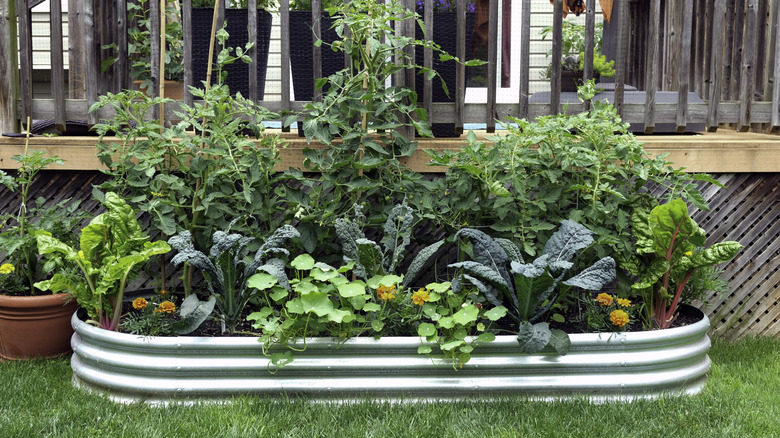Will Baking Soda Actually Kill Weeds In Your Veggie Garden?
We may receive a commission on purchases made from links.
As more people seek to live sustainably and contribute to protecting the environment, using baking soda in unexpected ways is ganing popularity as an environmentally sound alternative to other products we use in our homes. Cleaning your kitchen with baking soda offers a reliable, non-toxic solution that is also useful for certain tasks in the garden. Among them are its benefits as an inexpensive substitute for traditional herbicides, so yes, baking soda will effectively kill weeds in your veggie garden. However, it should be used carefully as it won't discriminate between a weed and your prize-winning roses.
Sodium bicarbonate — the actual chemical name for baking soda — works to kill weeds because its salt content will dehydrate the plant over time when applied directly to the foilage. It can be sprinkled directly out of the box, but it's best to disolve it in water and use the solution in a spray bottle. In fact, thanks to its benefits as a fungicide many gardeners already use a mild solution of sodium bicarbonate and water to control powdery mildew in certain plants and to treat black spot on roses. Incidentally, you can also kill weeds using vodka in a solution, but you're probably more likely to want to use less expensive baking soda than raid your liquor cabinet.
However, while baking soda will dry out the leaves of your weeds it may not kill the roots, so it is possible that they will come back, as they tend to do. But it does help to keep them at bay. You may well need to reapply it every 7-10 days in peak growing season, particularly for deep-rooted weeds.
How to safely use baking soda in your garden
To use baking soda right out of the box, wet the leaves of the unwanted plants first so that the baking soda sticks to them, then sprinkle about a teaspoon on each plant. To use as a solution, mix 10 tablespoons of baking soda to a gallon of water then pour into a sprayer bottle. Something like this 1-gallon Flo-Master would be good. The sprayer makes it easier to target them, and it prevents the baking soda from blowing away to other plants. Either way, its best to apply it on a sunny day, as rain will wash away the baking soda and reduce its efficacy.
There are a few things to keep in mind when using baking soda in the veggie garden. First, remember it's a non-selective herbicide, so it can negatively affect and even kill small plants and grass. It's best to use it on isolated weeds, like those that grow between pavers, along walkways, or in pavement cracks. If you garden in raised beds or other types of containers, you could carefully spray the weeds along the edges.
Also consider that, since it is water soluble, sodium bicarbonate can enter and remain in the surrounding soil, which will increase its salinity. This will have negative effects on existing plants and can make it harder to grow healthy veggies in the future if you overuse it. But with careful planning and judicious use, sodium bicarbonate can be a good ally to help keep your veggie garden weed free.

